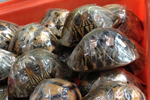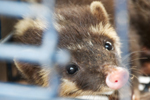In March, two people were caught attempting to smuggle 54 ploughshare tortoises (Astrochelys yniphora) into Thailand. Listed as Critically Endangered, the tortoises’ wild population is down to approximately 400-500 animals in its native Madagascar, meaning the smugglers were attempting to move over 10 percent of the total population. Now, the Scientific American blog Extinction Countdown reports that nearly half of the smuggled tortoises have died of unknown causes.
Given the hardiness of the species, experts were surprised at the high death-toll. But the loss only raises tension over the future of the remaining rescued tortoises. Returning to their native habitat in Madagascar may be one option, but there are concerns that the smuggled tortoises could carry foreign diseases. In addition, some fear smugglers will simply steal the tortoises from the wild again.
“We spend a lot of money in Madagascar for guards and boats and all kinds of things to protect these animals in their natural habitat, but whatever money we spend is trumped by the wealth of Asia. It overwhelms our little efforts,” Jim Juvik, senior scientist at the Turtle Conservancy, told Extinction Countdown.
The ploughshare tortoise, also known as the angonoka tortoise, is furthermore imperiled by land clearing by fires and predation by invasive bushpigs. In 2011, the species was listed as number 10 in the list of the world’s most threatened turtles.

Ploughshare and radiated tortoises confiscated in Bangkok. Photo by: P.Tansom/TRAFFIC.
Related articles
Over ten percent of a species’ total population found in smuggler’s bag

(03/25/2013) On Friday, March 15th Thai authorities arrested a 38-year-old man attempting to collect a bag containing 54 ploughshare tortoises (Astrochelys yniphora) and 21 radiated tortoises (Astrochelys radiata) in Suvarnabhumi International Airport. Found only in Madagascar both species are listed as Critically Endangered and protected under the Convention on International Trade in Endangered Species (CITES), but have become lucrative targets for the black-market pet trade given their scarcity and beauty.
Bizarre, little-known carnivore sold as illegal pet in Indonesian markets (photo)

(04/24/2013) Few people have ever heard of the Javan ferret-badger, but that hasn’t stopped this animal—little-known even to scientists—from being sold in open markets in Jakarta according to a new paper in Small Carnivore Conservation. The Javan ferret-badger (Melogale orientalis) is one of five species in the ferret-badger family, which are smaller than proper badgers with long bushy tails and elongated faces; all five species are found in Asia.
Market figures out that geckos don’t cure AIDS, but killing continues
(04/12/2013) Millions of tokay geckos continue to be traded for traditional medicine, despite waning belief that the colorful lizards are a cure for AIDS, reports a new study from TRAFFIC.
Photographers threatening the already-abused slender loris
-Arun-Kanagavel.150.jpg)
(03/12/2013) Caught in a beam of torchlight, the eyes of the slender loris reflect back a striking glow. In an effort to better understand these shy, nocturnal primates, a team of researchers set out to the Western Ghats of India. The resulting paper: Moolah, Misfortune or Spinsterhood? The Plight of the Slender Loris (Loris lydekkerianus) in Southern India was published in the Journal of Threatened Taxa in January of 2013. Forest walks and interviews with the Kani people, who live in close proximity to the lorises, supported evidence of a surprising new threat to the lorises: photographers.
Conservationists: ban the wild cheetah pet trade
(03/08/2013) A group of prominent conservation groups have joined an alliance of African states in calling on CITES to ban the trade in wild cheetah for the pet trade.
Captive frogs may be spreading diseases to wild cousins across Southeast Asia
(03/07/2013) Scientists have documented a series of links between exotic frogs for trade and diseases in wild frogs in Southeast Asia, including the first documented case of the chytrid fungus—a virulent and lethal disease—in Singapore. According to researchers writing in a new study in EcoHealth, frogs imported into Southeast Asia as pets, food, or traditional medicine are very likely spreading diseases to wild populations.







